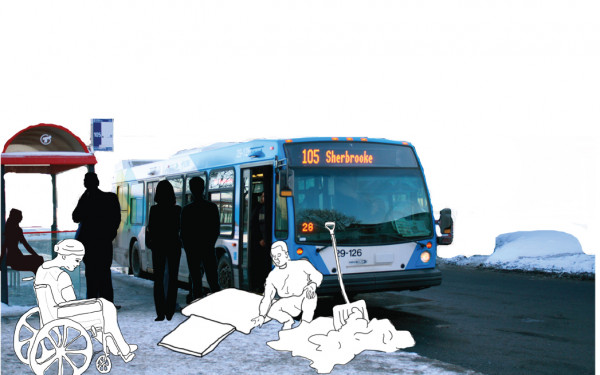Identical Fees, Unequal Access
No Progress Towards Fund for Disabled Students at ConU
Undergraduate students at Concordia pay $1.85 per credit in membership fees to the Concordia Student Union. In return, the CSU claims to represent all of its members by defending their rights, offering resources, promoting student life and providing support to the university by way of sustainable initiatives and accessible education.
While this deal might hold true and fair for the majority of Concordia’s roughly 35,000 undergrads, the school’s nearly 900 disabled students find themselves shortchanged of services provided to others, yet inaccessible to them—despite paying the exact same membership fees as everyone else.
Exemplifying the Problem
This reality became blatantly apparent recently as an effort to rectify and improve accessibility issues through the CSU is currently sitting at a standstill—in part, due to the exact challenges it seeks to eliminate.
At a Jan. 9 CSU council meeting, a motion was put forth by councillor Patrick Lefebvre, requesting that the union establish a Disabled Students Attendants Fund.
Lefebvre explained that the creation of such a fund would allow disabled students to attend and participate in CSU activities by providing them with the financial means to hire an aid.
Council then moved to have the idea brought to its Finance Committee, to further look into details, establish criteria and potentially arrange meetings with the university. It was then decided that Lefebvre should be present to provide suggestions and input.
Now, over a month later, no such meeting or discussion has taken place.
The CSU’s VP Finance Keny Toto says that the reason no progress has been made is because “unfortunately, Patrick [Lefebvre] was unable to come” to the scheduled meetings.
Lefebvre confirmed Toto’s statement, but elaborated on it.
“Keny Toto has advised me of two recent meetings, one on Jan. 16 and one this past week,” he said. “But he informed me literally 12 hours before the meetings were set to take place.”As VP Finance, Toto is responsible for calling and chairing Financial Committee meetings.
Lefebvre says that the short notice made it impossible for him to attend either of the two meetings.
“I can’t just pick up the phone and say, ‘I need to be somewhere in two hours, come pick me up’— that is just not how adapted transportation works.”
Lefebvre added that even adapted taxis, which he would have to pay for, require at least 24 hours notice to arrange.
“The planning of the meetings was really last-minute,” explained councillor and former VP Finance Jordan Lindsay. “Patrick [Lefebvre] was often being told the day before, and then because of that he couldn’t come.”
Lindsay added that, to his knowledge, no preliminary research looking into the fund has taken place.
Both Toto and Lindsay said a third meeting was called in which the committee tried to reach Lefebvre via a Skype video call—but couldn’t get through. Lefebvre says when he tried to return the call, no one picked up.
Who Can(’t) Help
Concordia’s Access Centre for Students with Disabilities describes its role as facilitating access to educational opportunities and services for disabled students, in addition to fostering a healthy and active integration into university life.
Due to funding limitations, the organization has been forced to prioritize, and currently only offers aid pertaining to academically related activities.
The centre falls under the larger umbrella of Student Services at Concordia—a sector that all students currently pay $10.26 per credit to.
Though it hasn’t seen cuts, the group hasn’t seen its funding increase since 2009, despite a steady increase in the number of disabled students using their services over the years. Between 2008-09 and 2011-12, the number of students using the centre increased from 754 to 882.
“This makes it hard for us to implement any kind of new initiatives,” said Brigitte St. Laurent-Taddeo, director of Concordia’s Advocacy and Support Services.
In addition to funds collected from a student fee levy, students with certain disabilities are eligible to receive funding from the Ministry of Higher Education, Research, Science and Technology.
“The funding received from the [Ministry] is strictly for academic activities,” said St. Laurent-Taddeo. “They don’t fund for anything outside of the classroom except for group projects.”
While she said the centre is unable to afford stretching its services to extra-curricular activities, St. Laurent-Taddeo said there is certainly a need for those kinds of resources to come from somewhere.
“The activities surrounding student life are something the university really values, and if there are ways to offer access to students who currently don’t have it, that would be wonderful.” she said.
“I know the CSU has been approached concerning this sort of thing, and I’m not sure if it’s something the they want to look into and possibly get involved with, but if that’s the case, I think that would be good news.”
She said that the centre has yet to be approached by the union with any questions or concerns relating to the matter—though she, alongside ACSD’s new manager Gordon Dionne, are both happy to provide support and guidance.
“[The CSU] will have to have establish criteria, and some kind of framework,” she said. “If they’d like to hear our comments, or advice—we’d be happy to do that.”
Not Giving Up
Despite being frustrated at the lack of progress towards realizing the fund, Lefebvre remains optimistic that it will eventually materialize.
“The only thing I want to do before I graduate is to have a fund set up,” he said.
“So that many more disabled students can go on, say, the New York trip, or can go to the Orientation concert. But we need to have a fund, because what people don’t realize is that these aids cost a lot of money.”
In addition to funding, Lefebvre says that education and awareness are other obstacles obstructing access. He says many disabled students “have no clue” that they need to go to the CSU for help outside of Concordia’s Access Centre.
“Part of the reason is that many of us […] are very shy about our disability. We don’t like to be a bother to people. It is embarrassing to, you know, ask for help.”
Lefebvre hopes that, through his involvement on CSU council, he can set an important and lasting precedent.
“I hope other students see me on the webcast and say, ‘Hey, this guy is in a wheelchair, and look what he’s doing. I can do that too, I want to get involved.’”
Despite the common misconception, Lefebvre emphasizes that disabled people are more than capable of becoming involved.
“My hope is that all students are aware—that even though we might be in a wheelchair, many of us that are disabled lead very active lives,” he said. “We do not let our disabilities stop us.”
He intends to bring the creation of the fund back to council at this Wednesday’s regular council meeting.
“I just want to be treated like everybody else—nothing more, nothing less—but also that people understand that special accommodations have to be made, and it’s not always easy for us.”




(WEB)_600_375_90_s_c1.jpg)

_600_375_90_s_c1.jpg)
